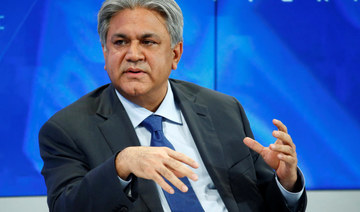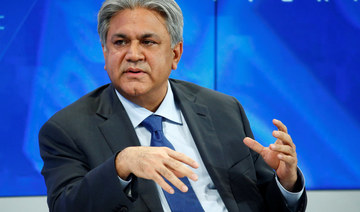LONDON: The Pakistani founder of Abraaj Group, once one of the largest emerging markets private equity investors, has been given more time to raise a £15 million ($19.5 million) bail by a London court, a court official said on Friday.
Arif Naqvi was arrested in Britain last month and has been awaiting possible extradition to the United States where he faces charges of defrauding investors.
Naqvi was remanded in custody after the bail hearing at Westminster Magistrates Court on Friday was adjourned until May 17 because he failed to pay the bail conditions, the official said.
On May 3, Westminster Magistrates Court granted Naqvi bail on condition that he pay £15 million and an additional surety of £650,000, as well as surrendering his Pakistani passport, remaining under 24-hour curfew at an address given to the court and wearing an electronic tag, a prosecution spokesman said at the time.
Dubai-based Abraaj had been the largest buyout fund in the Middle East and North Africa until it fell apart last year after a dispute with investors.
Naqvi has previously maintained his innocence. Under the U.S. charges, Naqvi is accused of inflating positions held by Abraaj in order to attract greater funds from them, causing them financial loss.
Abraaj founder given more time to raise £15m pound bail
Abraaj founder given more time to raise £15m pound bail
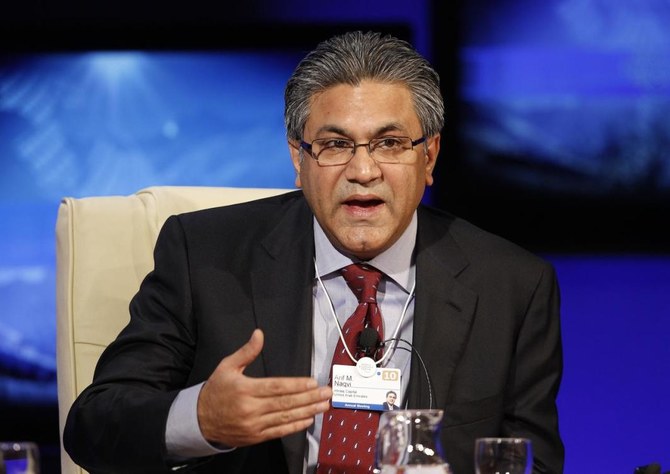
- Arif Naqvi was arrested in Britain last month and has been awaiting possible extradition to the United States where he faces charges of defrauding investors
- Dubai-based Abraaj had been the largest buyout fund in the Middle East and North Africa until it fell apart last year after a dispute with investors
Startup Wrap – Egyptian startups secure funding to boost Saudi expansions after battling stagnation

CAIRO: Startups in Egypt have started to gain momentum with several ventures securing funding to boost expansion efforts to the Kingdom.
Following a period of startup funding stagnation, Egyptian founders have made their way back to the regional venture capital space with a flurry of investment deals and expansion strategies already in place.
Egyptian fintech startup Waffarha has secured a seven-figure seed round from Value Makers Studio to expand its footprint.
Founded in 2012 by Tarek Magdy, the platform offers significant discounts, with daily deals ranging from 50 percent to 90 percent.
The new capital will enable Waffarha to enhance its technology, recruit talent, and expand into Saudi Arabia and additional markets.
Moreover, in 2018, Fawry for Banking Technology and Electronic Payments, one of Egypt’s largest financial institutions, acquired a share of 30 percent of the company.
The company claims to boast a network of over 1,000 merchants and over 3,000 stores that cater to more than 5 million customers, without any subscription fees.
Over the last 12 years, Waffarha claims to have emerged as a top-tier lifestyle website and mobile app.
Egyptian HR tech startup Bluworks secures $1m in pre-seed funding
Bluworks, an HR and Software-as-a-Service solutions provider based in Egypt, has raised $1 million in pre-seed funding led by Khawarizmi Ventures and included Camel Ventures, Acasia Ventures, and angel investors.
Founded in 2022 by Farah Osman, Hussein Wahdan, and Nour Ahmadein, Bluworks aims to optimize costs for businesses through data-driven decision-making.
“With so many HR softwares on the market, not one is built to manage blue-collar workers,” Wahdan said.
“Since the process of managing this type of workforce is so manual, errors frequently occur, leading to penalties and deducted salaries with no oversight from the workers, causing them to leave and ultimately contributing to high turnover rates,” he added.
“Currently, companies can spend about 7-10 days just closing their payroll accounts, but with Bluworks, this time can be cut down to one day - all while leveraging data and insights on their workforce,” he stated.
The company aims to utilize the funding to support its product development goals, expand its presence, and grow its team.
Egypt-based fintech Bokra closes $4.6m pre-seed funding round
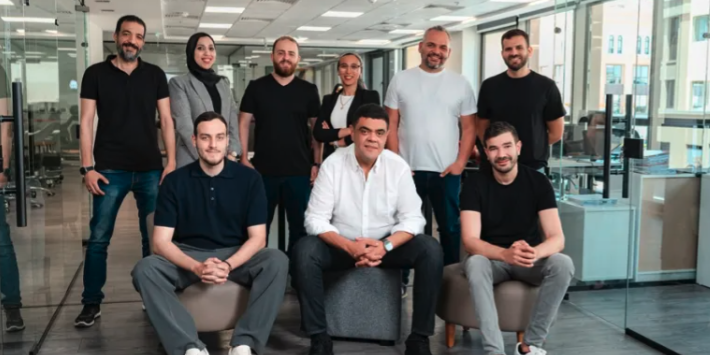
Bokra, an emerging fintech startup from Egypt, has secured $4.6 million in pre-seed funding, led by DisrupTech Ventures and SS Capital.
Founded in 2023 by Ayman El-Sawy, Bokra offers diversified investment solutions for retail and SME investors.
The funds will support the launch of the Bokra app, expansion of its investment products, and scaling operations across the Middle East and North Africa region.
“We are dedicated to accelerating financial inclusion and elevating investment awareness across MENA,” El-Sawy said.
“In a region where financial needs and aspirations are ever-changing, Bokra is poised to become the preferred investment platform for both individuals and small and medium-sized enterprises looking to diversify their fractional ownership portfolio in a simple, trackable and informed way,” he added.
Egyptian startups win big in Saudi-Egyptian program
Ten Egyptian startups have received awards from the VMS Bridge program, aimed at enhancing connections between Egypt and Saudi Arabia’s entrepreneurial ecosystems.
Winners included Amanleek, Farhy, Sprints, Career180, and Jamaykaa, which will explore investment opportunities during a 4-day visit to the Kingdom.
Other winners, Notchnco and Neqabty, received free company licenses in Saudi Arabia, and AgriCash, ReNile, and ICareer won access to Arweqah’s training programs.
Jordan-based healthtech startup Arab Therapy secures $1m seed funding
Arab Therapy, a Jordan-based mental health platform, has raised $1 million in seed funding, led by Flat6Labs and Vision Health Pioneers, with participation from international angel investors.
Founded in 2021 by Tareq Dalbah, Omar Koudsi, and Hekmat Al-Hasi, Arab Therapy connects users with licensed mental health professionals.
The investment will facilitate the company’s market expansion and the initiation of business to business sales operations.
TVM Capital Healthcare invests $17m in Neurocare Group AG
TVM Capital Healthcare, based in the UAE, has invested $17 million into Neurocare Group AG, a Munich-headquartered healthtech specializing in personalized mental healthcare.
The investment will support Neurocare’s expansion plans in the US and Saudi Arabia and fund the development of new hardware and software innovations, enhancing their clinical solutions.
UAE-based logistics startup Shorages secures $1m for expansion
Shorages, a UAE-based logistics startup, has raised $1 million in a pre-series A funding round led by Joa Capital’s S3 Ventures Fund.
Founded in 2019 by Rayan Osseiran, the company provides fulfillment solutions in the UAE and Saudi Arabia for e-commerce platforms.
The company aims to utilize the funding to help expand its warehouse operations across the Gulf region.
UAE e-commerce startup WEE secures $12m in funding
UAE-based e-commerce startup WEE has concluded a $12 million pre-series A funding round, facilitated by SIG Investment.
Founded in 2021 by Anastasia Kim, Oleg Dashkevich, and Sergey Kolikov, WEE is an online marketplace that offers below 15-minutes delivery services.
The investment will be used to spearhead WEE’s logistics capabilities, accelerate growth, and expand its team.
Turkish fintech app Midas closes $45m funding round to boost MENA expansion
Turkish fintech app Midas closed a $45 million funding round by Portage, a global investment platform, supported by International Finance Corporation, Spark Capital and Earlybird Digital East Fund.
Founded by Egem Eraslan, the company allows users in Turkiye to invest in Turkish and US equities.
The startup is aimed at Turkiye’s retail investor market and claims to have more than 2 million users. The company claims to charge significantly lower transaction and commission fees for Turkish customers who want to invest in US or Turkish stocks.
Midas has plans to expand beyond Turkiye, and aims to target countries in the MENA region, according to a report by TechCrunch.
Midas also plans to use the new funding to roll out three new products in cryptocurrency trading, mutual funds and savings accounts.
UAE’s Maalexi signs agreement with Etihad Credit Insurance
Maalexi, a UAE-based risk management platform focused on SME agri-businesses, has entered into a strategic credit insurance agreement with Etihad Credit Insurance, the UAE’s federal export credit company.
This collaboration will enable Maalexi to utilize ECI’s extensive trade credit solutions and services, enhancing the competitiveness of regional SMEs in the food and agriculture trade sectors, both locally and internationally.
The partnership aims to reduce market entry barriers, support Maalexi’s goal of increasing SME participation in the cross-border trade of agricultural produce, and contribute to food security in the UAE.
Oil Updates – prices on track to snap 2-week losing streak

SINGAPORE: Oil prices rose on Friday, on track to end higher this week after two straight weeks of losses, after a top US official expressed optimism over economic growth and as supply concerns lingered due to conflicts in the Middle East. according to Reuters.
Brent crude futures gained 31 cents, or 0.4 percent, to $89.32 a barrel at 6:47 a.m. Saudi time, and US West Texas Intermediate crude futures rose by 23 cents, or 0.3 percent, to $83.80 a barrel.
For the week, Brent has gained 2.3 percent so far, while WTI is up 0.8 percent.
Treasury Secretary Janet Yellen told Reuters on Thursday US gross domestic product growth for the first quarter could be revised higher, and inflation will ease after a clutch of “peculiar” factors held the economy to its weakest showing in nearly two years.
US economic growth was likely stronger than suggested by weaker-than-expected quarterly data, she said.
Data showed that economic growth slowed in the first quarter, and prior to Yellen’s comments, tremors from an acceleration in inflation had weighed on oil prices as investors calculated that the Federal Reserve would not cut interest rates before September.
Elsewhere, supply concerns as geopolitical tensions continue in the Middle East also buoyed prices early in the session.
Israel stepped up airstrikes on Rafah after saying it would evacuate civilians from the southern Gazan city and launch an all-out assault despite allies’ warnings this could cause mass casualties.
Saudi Arabia’s business landscape witnessing dynamic shift as AI adoption rises

- Companies urged to set their agenda without delay, prepare to adapt to evolution
RIYADH: Saudi Arabia’s business environment has witnessed a drastic shift in recent years as employers consider artificial intelligence a critical tool for their operations.
With the Kingdom hosting major technology events like LEAP, regional business owners and employees have recognized the need to upskill their proficiency in AI-related operations to catalyze growth.
Talking to Arab News, Rami Mourtada, partner and director of Boston Consulting Group, said companies in Saudi Arabia should set their AI agenda imminently and prepare to adapt to this dynamic evolution.

“Transformative AI adoption in the Kingdom cannot happen without proper business adoption, and businesses that haven’t should quickly set their own AI agenda, define a strategic AI roadmap, pilot promising use case, and engage the organization properly for this change,” said Mourtada.
He added: “As business leaders progress this journey, events like LEAP are important for learning from other businesses’ experience, engaging with experts to help refine their agenda, and getting new ideas for use case to pilot.”
Bridging the AI gap between employers and employees
A current report by US-based management consulting firm Oliver Wyman disclosed that Saudi Arabia and the wider Middle East region have invested heavily in national AI strategies in recent years, and the approach is paying off.
The study revealed that the Kingdom’s young population born between 1997 and 2010 has already recognized the benefits of this new technology, with more than half acknowledging the advantages AI will offer in enhancing productivity.
Ana Kreacic, chief knowledge officer at Oliver Wyman, said that bridging the gap between employers and employees is necessary to ensure the smooth adoption of AI in businesses.

“Currently, there is a big disconnect between employers and employees. While CEOs recognize AI’s potential and many already are redesigning work to improve productivity, streamline operations, or gain a competitive advantage, they underestimate many aspects of the technology,” said Kreacic.
She added: “Businesses should create a shared mission around AI’s adoption, not only around improved business productivity but also how the technology will affect workers and their roles. Business leaders right now must prioritize how to motivate younger workers, develop and train them, and allay their anxieties.”
The analysis by Oliver Wyman underscored that about 57 percent of the employees surveyed in Saudi Arabia revealed that the training provided by their companies on AI was insufficient, while 40 percent demanded peer-to-peer mentorship programs to adapt to the change.
“There is a lack of understanding and trust about how AI will affect work and how businesses plan to support their employees through the AI transition. More than ever, businesses need to communicate regularly with their employees about their plans, providing clear guidelines, and also double down on ongoing AI skill-building and training,” noted Kreacic.
She further emphasized that business leaders should prioritize motivating and training young workers, which will ultimately reduce their anxieties surrounding the tech adoption.
“Most AI-enabled tools are continuously improving, which means employees not only need to learn how to use these tools once but that they will continue to learn new things as they engage with the tools over time. This is different from most past technologies we’ve interacted with, and part of the reason why employees ranked AI as their top reskilling priority,” Kreacic told Arab News.
Kreacic further pointed out that businesses also need to focus on digital training for individuals born between the mid-1990s and the mid-2010s, or Gen Zers, who lack the skills required for AI despite their computer training and knowledge.
“Businesses also need to help them develop the soft skills that are becoming even more crucial as AI eliminates repetitive roles. Many Gen Zers were onboarded during the pandemic or spend less time in the office because of remote and hybrid work and haven’t yet acquired the skills that older generations learned while working alongside senior colleagues,” she added.
The vitality of encouraging AI adoption by alleviating fears
Even though adopting AI will increase businesses’ productivity, the majority of workers are worried that this trend will negatively impact their job security.
“There is increasing anxiety from the general workforce about AI’s impact on their job security, especially as its adoption rises — more employees see its capabilities and impact 1st hand. BCG research has shown that the optimal setup — i.e., resulting in the least risk of bias or error — is where humans act as oversight, with key checkpoints, for AI-transformed processes,” said Mourtada.
He added: “Employees should first influence their employers to adopt this hybrid approach and second engage with it to capture the benefits directly.”
The Oliver Wyman study revealed that 69 percent of Saudi Arabia’s young people are worried about the impact AI will have on job security, compared to 59 percent of older adults.
According to the report, senior employees may feel more secure in their careers because they believe AI will have less impact on higher-level employment.
“That fear already is impacting talent retention. 24 percent of Saudi Gen Zers are looking for other jobs that are more secure in the AI transition compared to 14 percent globally,” said Kreacic.
She added: “Business and government can address these fears and discourage workers from fleeing unnecessarily by communicating clearly and regularly about how generative AI will affect work and which activities will be substituted, augmented or transformed — as well as how they plan to support their employees through the transition.”
According to Kreacic, businesses should create a shared mission around the adoption of AI, not only around improved business productivity but also how the technology will affect workers and their roles.
“As companies become increasingly reliant on AI technology, younger workers may feel less and less connected to a company, so nurturing the young workers’ sense of belonging will be critical to allowing them to reach their full potential at work,” she told Arab News.
Closing Bell: TASI edges down to close at 12,254 points
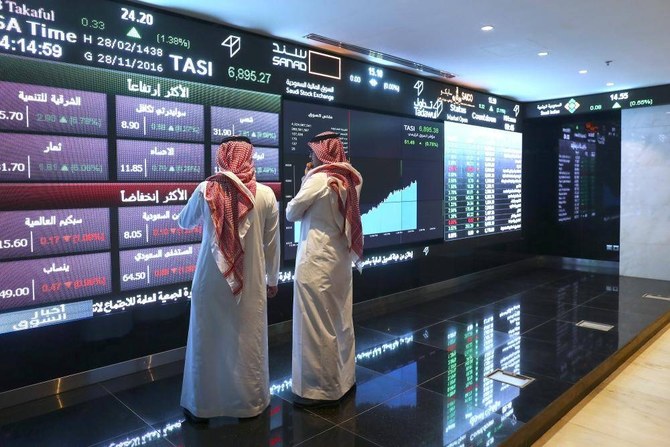
RIYADH: Saudi Arabia’s Tadawul All Share Index dipped on Thursday, losing 101.16 points, or 0.82 percent, to close at 12,254.53.
The total trading turnover of the benchmark index was SR6.9 billion ($1.84 billion) as 75 stocks advanced while 144 retreated.
Similarly, the MSCI Tadawul Index decreased by 8.99 points, or 0.58 percent, to close at 1,539.63.
The Kingdom’s parallel market, Nomu, increased, gaining 362.13 points, or 1.38 percent, to close at 26,688.25. This comes as 34 stocks advanced while as many as 27 retreated.
The best-performing stock of the day was Fawaz Abdulaziz Alhokair Co. The company’s share price surged by 6.39 percent to SR11.32.
Other top performers include Etihad Atheeb Telecommunication Co. and Saudi Cable Co., whose share prices soared by 5.57 percent and 5.35 percent, to stand at SR125and SR74.8 respectively. National Metal Manufacturing and Casting Co. and Saudi Steel Pipe Co. also fared well.
The worst performer was Al Sagr Cooperative Insurance Co., whose share price dropped by 7.11 percent to SR33.30.
ACWA Power as well as Bawan Co., did not perform well as their share prices dropped by 6.87 percent and 5.78 percent to stand at SR420 and SR44, respectively.
On the announcements front, a general assembly of Bank AlJazira approved increasing the capital by SR2.05 billion, representing a 25 percent increase.
This growth will be achieved through the capitalization of a portion of the statutory reserves, granting one share for every four shares to strengthen the bank’s capital base and enable it to achieve its strategic objectives, according to Al-Ekhbariya.
Additionally, authorization was granted to the board of directors to distribute interim dividends on a semi-annual/quarterly basis for the fiscal year 2024. Approval was also given to the compensation and benefits policy for senior executives at Bank AlJazira.
Moreover, the profits of Banque Saudi Fransi rose to SR1.15 billion during the first quarter of 2024, a 7 percent increase compared to the same period in 2023, which stood at SR1.07 billion.
The bank attributed this growth to a rise in commission income by 27.5 percent, primarily due to higher returns on financing and investments. However, there was a slight decrease in net commission income by 0.3 percent due to an increase in specific commission expenses.
Additionally, total operating expenses decreased 6.2 percent, mainly due to a reduction in the provision for expected credit losses on loans and advances. This was partially offset by an increase in the provision for other financial assets and rising staff salaries and expenses.
On another note, the stock of Al-Rajhi Co. for Cooperative Insurance SJSC, Al Rajhi Takaful, which is counted for in the insurance sector on the main market, recorded its highest price since listing on April 25, at SR142.
Furthermore, Saudi Exchange approved the listing request for government debt instruments issued by Saudi Arabia, totaling SR5.1 billion.
These instruments comprise issuance number 2024-04-07, valued at SR1.6 billion, and 2024-04-12, valued at SR3.5 billion. Trading of these instruments will commence on April 29.
Additionally, Rawabi Holding Co., also referred to as Rawabi, has successfully concluded its largest Saudi Riyal-denominated sukuk issuance, totaling SR1.2 billion. Driven by high market demand, this milestone surpasses Rawabi’s previous issuance record of SR875 million in 2023.
Since the launch of its sukuk program in 2020, Rawabi Holding has issued approximately SR6.5 billion across 18 tranches and redeemed seven tranches totaling around SR2.9 billion.
Rapid expansion of batteries crucial to meet COP28 climate goals: IEA

RIYADH: Global battery production must be scaled up to meet the climate security goals set at COP28, according to the International Energy Agency.
In its latest report, IEA said battery technology witnessed unprecedented growth in 2023, outstripping almost all other clean power source solutions.
The think tank added that an expected sharp fall in battery costs will accelerate the shift to renewable energy from fossil fuels in the coming years.
“Growth in batteries outpaced almost all other clean energy technologies in 2023 as falling costs, advancing innovation and supportive industrial policies helped drive up demand for a technology that will be critical to delivering the climate and energy targets outlined at the COP28 climate conference in Dubai,” said IEA in the report.
It added: “After their deployment in the power sector more than doubled last year, batteries need to lead a sixfold increase in global energy storage to enable the world to meet 2030 targets.”
During the COP28 summit, nearly 200 countries agreed to triple renewable energy capacity by 2030, double the pace of power source efficiency improvements, and transition away from fossil fuels.
The report added that 1,500 gigawatts of battery storage would be required to triple renewable capacity globally by the end of this decade.
However, IEA warned that a shortfall in deploying enough batteries could stall clean energy transitions in the power sector.
Battery manufacturing
According to IEA, battery manufacturing has more than tripled in the last three years, with China accounting for 83 percent of current production capacity, up from 75 percent in 2020.
The report added that 40 percent of announced plans for new battery manufacturing are in advanced economies such as the US and EU.
“If all those projects are built, those economies would have nearly enough manufacturing to meet their own needs to 2030 on the path to net zero emission,” said IEA.
In the earlier days, the most common type of batteries, those based on lithium-ion, were typically associated with consumer electronics. However, today, the energy sector accounts for over 90 percent of overall battery demand, said the report.
The intergovernmental organization added that battery deployment in the power sector increased by more than 130 percent in 2023 compared to the previous year, adding a total of 42 GW.
Moreover, batteries have enabled electric car sales to surge from 3 million in 2020 to almost 14 million last year in the transport sector.
Earlier in April, another report by IEA revealed that global sales of electric cars grew by approximately 25 percent in the first quarter of this year compared to the same period in 2023.
“The electricity and transport sectors are two key pillars for bringing down emissions quickly enough to meet the targets agreed at COP28 and keep open the possibility of limiting global warming to 1.5 degrees Celsius, ” said Fatih Birol, IEA’s executive director.
He added: “Batteries will provide the foundations in both areas, playing an invaluable role in scaling up renewables and electrifying transport while delivering secure and sustainable energy for businesses and households.”
Falling costs
According to IEA, battery costs have fallen by over 90 percent in less than 15 years, one of the fastest declines ever seen in clean energy technologies.
However, the agency highlighted that costs must come down further without compromising quality and technology.
“The combination of solar PV (photovoltaic) and batteries is today competitive with new coal plants in India. And just in the next few years, it will be cheaper than new coal in China and gas-fired power in the US. Batteries are changing the game before our eyes,” said Birol.
According to IEA, ensuring energy security also requires greater diversity in supply chains, including extracting and processing the critical minerals used in batteries.
Birol noted that governments worldwide have an important role in building resilient local and international supply chains to ensure that securely and sustainably produced batteries come to market at a reasonable cost.
“Legislation such as the Inflation Reduction Act in the US, the Net-Zero Industry Act in the EU, and the Production Linked Incentive in India are good examples of how policy can affect real change in the industry by backing technology manufacturing,” said Birol.
He also underscored the necessity to implement supportive policies to help speed up deployment by minimizing barriers to market entry for developers and reducing red tape that can stifle new projects.
Key to energy transition
In its report, IEA also highlighted the versatility of battery storage to ensure clean energy transition.
“In the power sector, batteries help smooth out the variability of renewable electricity from technologies such as wind and solar,” said the agency.
IEA added that battery storage can alleviate grid congestion in times of high supply, offering an outlet to capture and store excess renewable electricity that would otherwise be lost.
“Reducing emissions and getting on track to meet international energy and climate targets will hinge on whether the world can scale up batteries fast enough. More than half the job that we need to do will rely, at least in some part, on battery deployment,” added Birol.
Moreover, batteries can also provide critical service in the case of emergencies caused by extreme weather or other disruptions.
The deployment of batteries will also provide the grid with highly technical services, such as voltage and frequency control, that can help system operators and provide access to people who lack electricity.
“In a pathway to achieving universal energy access worldwide by 2030, they help 400 million people in emerging and developing economies gain electricity access through decentralized solutions like solar home systems and mini-grids with batteries,” IEA concluded.



